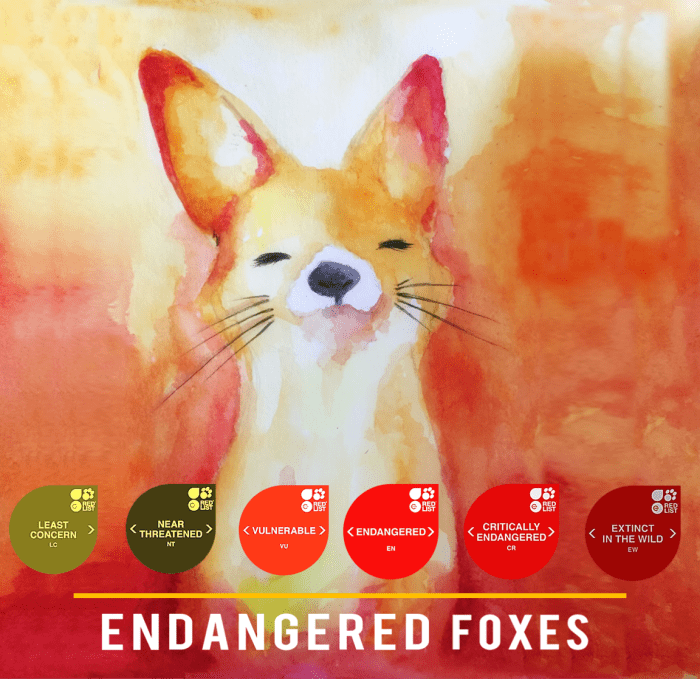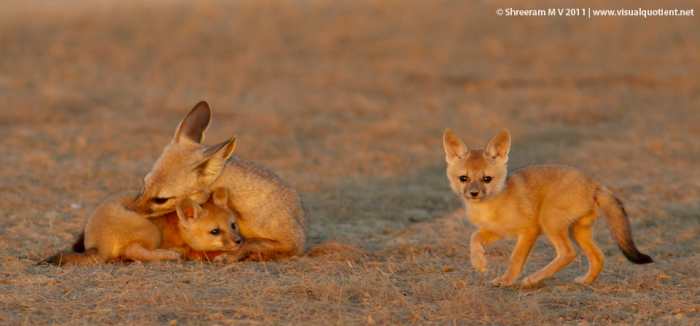11 Endangered Foxes That May Become Extinct
Foxes are close relatives and the smallest members of the Canidae family (dogs, wolves, coyotes, and jackals). They look like a small and slender dog with a long bushy tail and thick and soft fur on the tail, foxes living in cold places usually have long hair and other foxes have short or medium hair.
There are approximately 37 species of foxes in the world, of which 12 foxes are considered "true fox species" and belong to the genus Vulpes (scientific name). In recent years it has been observed that the population of these beautiful animals is decreasing. Their population has decreased in recent years.
It's unfortunate that over 50% of fox species are either endangered, threatened or have recently received least concern statuses (population stable). In this article, know about those 11 species of foxes which have been kept in the endangered category.
Endangered Foxes and Their Conservation Status
Know the conservation status of all these species of foxes and their present condition,
| Fox Species | Scientific name | Conservation status |
|---|---|---|
The swift fox | Vulpes velox | Nearly extinct in the 1930s, Least Concern |
Sierra Nevada red fox | Vulpes vulpes necator | IUCN Red List of Critically Endangered |
The Bengal fox (Indian Fox) | Vulpes bengalensis | IUCN Red List of Threatened Species |
Cape Fox (Silver Fox) | Vulpes chama | Least Concern (population stable), Since yr. 2004 |
Arctic Fox | Vulpes lagopus | Least Concern (population stable) |
Fennec Fox | Vulpes zerda | Least Concern (population stable) |
Arabian fox | Vulpes vulpes arabica | Least Concern (population stable) |
Rusian Red Fox | Vulpes vulpes) | Least Concern (population stable) |
Tibetan sand fox | Vulpes ferrilata | Least Concern (population stable) |
The Island Fox | Urocyon littoralis | Least Concern (population increasing) |
San Joaquin kit fox | Vulpes macrotis | Threatened (USFWS 1998). Still endangered, after 50 years of introduced to endangered list by ICUN. |
1. Swift fox
The swift fox is a small and endangered dog species in North America, weighing between 2 and 3 kilograms and having an average height of 30 centimeters that lives in the North American states of Montana, Colorado, Oklahoma and Texas, and Mexico.
The Swift fox was a critically endangered species in the 1930s due to predator control programs aimed mostly at the gray wolf and coyote, but recently the conservation status of this species has been downgraded to least concern by the IUCN.
2. Sierra Nevada Red Fox
The Sierra Nevada red fox also known as the High Sierra fox or Sierra red fox lives in high mountain habitats. Basically, they are a subspecies of red foxes, whose physical traits, coat and coloration are similar to red foxes, but they are smaller than red foxes.
Sierra Nevada red foxes are among the critically endangered mammals in North America.
These are already in the endangered category whose genetic diversity makes them highly vulnerable to extinction. Additionally, they are at even greater risk of extinction due to habitat loss in shrinking forests, human encroachment into their area, and mixing with non-native foxes.
3. Indian Bengal Fox
The Bengal fox or Indian fox is native to India, ranging from the Himalayas in Nepal to the southern tip of the Indian Peninsula. They are small foxes with relatively slender legs compared to others and a very bushy tail.
In the year 1990 very few Bengal Foxes were left and they are identified by the IUCN to Critically endangered category.
Since 1950, their population has decreased rapidly and nowadays foxes of this species have become rare. Hunting for its skin and meat, and conversion of its grasslands to agriculture, industry is the main causes of their extinction.
4. Cape Fox (Silver Fox)
The Cape fox, also known as the maltose, asse, cama fox, silver-backed fox, big-eared fox or bat-eared fox, is native to the arid regions of eastern and southern Africa. They resemble the red fox in appearance, but have unusually large ears. These foxes are yellow-brown in color, their face and legs are black, ears and tail are also black.
Cape foxes are active mainly at night, lying down during the day. They are opportunistic and are known to hunt and eat reptiles, rabbits, spiders and birds. They also eat eggs and meat and most insects or fruits.
in the 80's, Cape Foxes were introduced to the list of endangered by IUCN.
1980 – Introduced to endangered list
1996 – Lower Risk/least concern (LR/lc)
2004 – Least Concern (LC)
In the decade of 80, there was a lot of decline in their population, but since the 90s, their concern has improved and till the year 2004, they were in the least concerned category, and since then their population has remained stable.
5. Darwin Fox
The Darwin fox is an endangered fox species, also known as the Darwin fox, Darwin's Zorro, Zorro de Darwin. Darwin's foxes are named after Charles Darwin.
The Darwin fox is smallest of all fox species. it was previously classified as Critically Endangered in 2004 and 2008, based on an estimated population size of "fewer than 250 mature individuals.
The Darwin Fox has a thick brown-black coat, with a rust-tinged appearance of the legs and around the ears, and a dark brown tail. It differs from the gray fox because its color is darker, it has shorter legs and the skull is broader and shorter. Darwin's fox has a wide range of options when it comes to diet in the dense forests where it exists. These foxes hunt mammals, reptiles, beetles. Sometimes it selects fruits and berries.
6. Fennec Fox
The fennec fox is the world's smallest nocturnal fox and dog species, found in the Sahara of North Africa and also known as the desert fox. They are a rare fox species, their small size, round eyes and large ears make them unique. They are also kept as pets and are one of the most beloved, popular exotic pets.
They were once listed as endangered by the IUCN, but in recent years their population has increased and they have fallen off the IUCN's endangered list.
As of 2015, the fennec fox is classified as Least concern on the IUCN Red List.
7. Arctic Fox (Polar Fox)
The Arctic fox lives throughout the Arctic tundra through Alaska, Canada, Greenland, Russia, Norway, Scandinavia, and Iceland and is one of the rare animals that can survive temperatures below 50 degrees. They are also known as Polar Fox, White Fox and Snow Fox. They have long, dense, thick fur that helps them survive in the cold snow and their long furry tails help them cover their bodies and hide their face and nose to protect them from the snow.
Unfortunately, the population of these little foxes is declining. The shrinking ice cover due to global warming and hunting by humans for their fur is another major reason for their declining population.
The two Arctic fox subpopulations are. One is on the Medny Island (Commander Islands, Russia), which was reduced by about 85–90% in the year 1970. But this endangered fox has shown signs of returning In the summer of 2022, volunteers patrolling for Arctic fox dens saw a welcome surprise.
And the world population of Arctic foxes is thus not endangered.
But their other Scandinavian mainland population where it is endangered.
8. Arabian Fox
The Arabian red fox is a subspecies of the red fox native to Arabia. It is similar to the common red fox in color, but the Arabian red fox has a slimmer body and longer legs. It is much smaller than the European red fox and has much larger ears which help dissipate heat. The Arabian Red Fox also has fur between the toes, which protects the feet from burning. Its slender body, large ears and long tail give it a distinct appearance compared to other red foxes.
They were listed as endangered by the IUCN, but their population is now stable and they are in the Least Concern category.
9. Tibetan Sand Fox
Tibetan sand foxes are small and compact foxes, also known as sand foxes or Tibetan foxes. They are native to the Tibetan Plain and live in the Ladakh Plateau, Nepal, China, Sikkim and Bhutan. They are distinctly unique foxes with narrow snouts and strange, square faces.
Once introduced to ICUN endangered list, now they are classed as "least concern" for extinction by the IUCN.
10. The Island fox
The island fox is a small fox that is the closest relative, the gray fox but is much smaller in size. They are native to six of California's eight Channel Islands. There are six subspecies, each of which is unique to the island where it lives.
1. San Miguel Island fox (Urocyon littoralis littoralis
2. Santa Rosa Island fox (Urocyon littoralis santarosae)
3. Santa Cruz Island fox (Urocyon littoralis santacruzae)
4. Santa Catalina Island fox (Urocyon littoralis catalinae)
5. San Nicolas Island fox (Urocyon littoralis dickey)
6. San Clemente Island fox (Urocyon littoralis clementae)
All these foxes reflect their evolutionary history, which are considered an U.S. Endangered Species (2004) on four islands: San Miguel, Santa Rosa, Santa Cruz and Santa Catalina Islands
And once nearly extinct California Island foxes are no longer endangered.
11. Kit Fox (San Joaquin kit fox)
The kit fox, also known as desert fox, Zora del desert and Zora norteña in Spanish and Wustenfuchs in German, is a species of North American fox. They are known for their small size, big ears, bright eyes, but very few foxes of this species remain, and it is federally classified as Endangered, and as Threatened by the state of California (USFWS 1998).
Further read
- 20 Endangered Wolves That May Become Extinct
You may wonder to know, that more than 20 Wolves are Probably Extinct or Critically Endangered like The Ethiopian wolf, The Red Wolf, Golden Wolf, Iberian Wolf, Dhole, Indian wolf, Himalayan wolf .. - 15 Dogs That Look Like Foxes
Many people would love to have a pet fox, but foxes are not domesticated creatures or cuddly pets. Instead, here are 15 dog breeds to choose from that resemble foxes. - Unique and Rare, Endangered Dog Species
The Rare Endangered Dog, Fox, and Wolves and interesting facts, including unique characteristics. The list includes Fennec, Maned Wolf, Maltose, Bush Dog, Cape Fox, Arabian Fox and more.
Comments
Cassie Priestly on March 10, 2020:
I love foxes, this is a big help for me assignment I have to do! Thank you so much!































